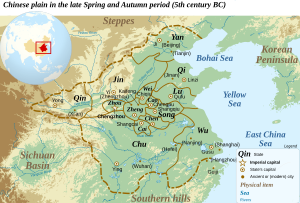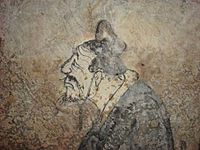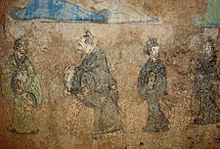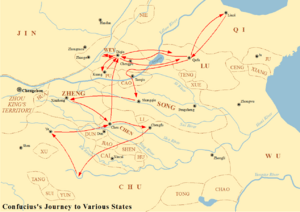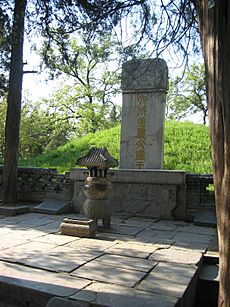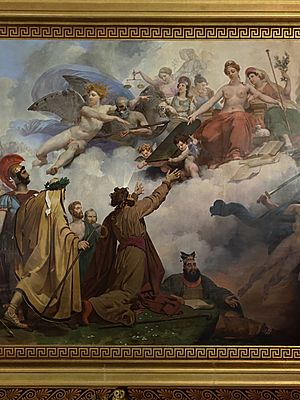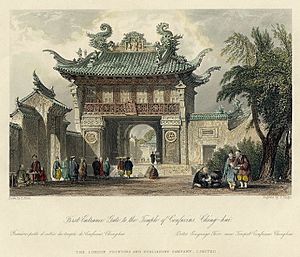Confucius facts for kids
Quick facts for kids
Confucius
|
|
|---|---|
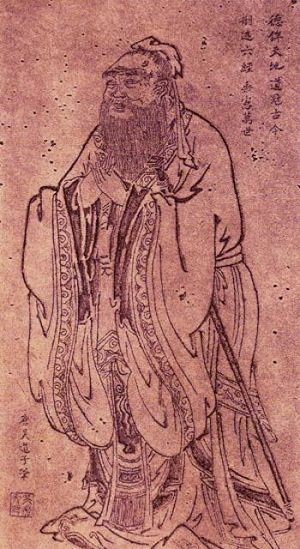
Imaginary portrait by Wu Daozi (685–758), Tang dynasty
|
|
| Born |
Kǒng Qiū
c. 551 BCE |
| Died | c. 479 BCE (aged 71–72) Si River, State of Lu
|
| Spouse(s) | Lady Qiguan |
| Era | Hundred Schools of Thought (Ancient philosophy) |
| Region | Chinese philosophy |
| School | Confucianism |
| Notable students | Yan Hui, Zengzi Disciples of Confucius |
|
Main interests
|
Ethics, education, music, poetry, political philosophy, Social philosophy |
|
Notable ideas
|
Confucianism, Golden Rule |
|
Influenced
Virtually all subsequent Chinese philosophy, particularly Mencius, Xun Kuang, Zhu Xi, Wang Shouren, the Neotaoists, as well as Han Yu and the Neoconfucians. Also influenced multiple Western thinkers including Niels Bohr, Benjamin Franklin, Allen Ginsberg, Thomas Jefferson, Gottfried Wilhelm Leibniz, Robert Cummings Neville, Alexander Pope, Ezra Pound, François Quesnay, Friedrich Schiller, Voltaire, and Christian Wolff
|
|
| Confucius | |||||||||||||||||||||||||||||||||||||||||||
|---|---|---|---|---|---|---|---|---|---|---|---|---|---|---|---|---|---|---|---|---|---|---|---|---|---|---|---|---|---|---|---|---|---|---|---|---|---|---|---|---|---|---|---|
| Confucius | |||||||||||||||||||||||||||||||||||||||||||

"Confucius (Kǒngzǐ)" in seal script (top) and regular (bottom) Chinese characters
|
|||||||||||||||||||||||||||||||||||||||||||
| Chinese name | |||||||||||||||||||||||||||||||||||||||||||
| Chinese | 孔子 | ||||||||||||||||||||||||||||||||||||||||||
| Hanyu Pinyin | Kǒngzǐ | ||||||||||||||||||||||||||||||||||||||||||
| Literal meaning | "Master Kǒng" | ||||||||||||||||||||||||||||||||||||||||||
|
|||||||||||||||||||||||||||||||||||||||||||
| Kong Qiu | |||||||||||||||||||||||||||||||||||||||||||
| Chinese | 孔丘 | ||||||||||||||||||||||||||||||||||||||||||
| Hanyu Pinyin | Kǒng Qiū | ||||||||||||||||||||||||||||||||||||||||||
|
|||||||||||||||||||||||||||||||||||||||||||
Confucius ( kən-FEW-shəs; Chinese: 孔夫子; pinyin: Kǒng Fūzǐ, "Master Kǒng"; or commonly 孔子; Kǒngzǐ; c. 551 – c. 479 BCE) was a Chinese philosopher and politician of the Spring and Autumn period. Confucius's teachings and philosophy are influential across China and East Asia to this day.
His philosophical teachings, called Confucianism, emphasized personal and governmental morality, correctness of social relationships, justice, kindness, and sincerity.
Confucius is traditionally credited with having authored or edited many of the Chinese classic texts. Aphorisms concerning his teachings were compiled in the Analects, but only many years after his death.
Confucius's principles have a lot in common with Chinese tradition and belief. He championed strong family loyalty, ancestor veneration, and respect of elders by their children and of husbands by their wives, recommending family as a basis for ideal government. He promoted the Golden Rule, "Do not do to others what you do not want them to yourself".
Contents
Name
The name "Confucius" is a Latinized form of the Mandarin Chinese Kǒng Fūzǐ (孔夫子, "Master Kong"), and was coined in the late 16th century by the early Jesuit missionaries to China. Confucius's clan name was Kong (孔, OC:*kʰˤoŋʔ) and his given name was Qiu (丘, OC:*[k]ʷʰə). His "courtesy name", given at his coming of age ceremony, and by which he would have been known to all but his older family members, was Zhongni (仲尼, OC:*N-truŋ-s nr[əj]). The "Zhòng" indicated that he was the second son in his family.
Early life
Confucius was born on September 28, 551 BCE, in Zou. the state of Lu (鄒, in modern Shandong province). His father Kong He (or Shuliang He) was an elderly commandant of the local garrison.
Kong He died when Confucius was three years old, and Confucius was raised by his mother Yan Zhengzai (顏徵在) in poverty. His mother later died at less than 40 years of age. At age 19 he married Lady Qiguan (亓官氏), and a year later the couple had their first child, their son Kong Li (孔鯉). Qiguan and Confucius later had two daughters together, one of whom is thought to have died as a child and one was named Kong Jiao (孔姣).
Confucius was educated at schools for commoners, where he studied and learned the Six Arts.
Confucius was born into the class of shi (士), between the aristocracy and the common people. He is said to have worked in various government jobs during his early 20s, and as a bookkeeper and a caretaker of sheep and horses. He used his earnings to give his mother a proper burial. When his mother died, Confucius (aged 23) is said to have mourned for three years, as was the tradition.
Political career
By 501 BCE, Confucius was already well-knoewn adn respected for his teaching. The same year, he was appointed to the minor position of governor of a town. Eventually, he rose to the position of Minister of Crime.
Confucius decided to dedicate himself to serve his motherland and served the government for four years. He contributed greatly to the development of the country, but due to disagreements with the ruler, his political career ended.
Confucius made powerful enemies and departed his homeland in 497 BCE. He remained in self-exile and was unable to return as long as his enemies were alive.
Exile
Confucius left his post. After his resignation, he began a long journey around the principality states of north-east and central China including Wey, Song, Zheng, Cao, Chu, Qi, Chen, and Cai (and a failed attempt to go to Jin). At the courts of these states, he explained his political beliefs but did not see them implemented.
Return home
According to the Zuozhuan, Confucius returned home to his native Lu when he was 68, after he was invited to do so by Ji Kangzi, the chief minister of Lu. The Analects depict him spending his last years teaching 72 or 77 disciples and transmitting the old wisdom via a set of texts called the Five Classics.
During his return, Confucius sometimes acted as an advisor to several government officials in Lu, including Ji Kangzi, on matters including governance and crime.
He died at the age of 71 or 72 from natural causes. Confucius was buried in Kong Lin cemetery which lies in the historical part of Qufu in the Shandong Province. The original tomb erected there in memory of Confucius on the bank of the Sishui River had the shape of an axe. In addition, it has a raised brick platform at the front of the memorial for offerings such as sandalwood incense and fruit.
Philosophy
Confucianism is often followed in a religious manner by the Chinese. Confucianism discusses elements of the afterlife and views concerning Heaven, but it is relatively unconcerned with some spiritual matters often considered essential to religious thought, such as the nature of souls.
In the Analects, Confucius puts the greatest emphasis on the importance of study. He wanted his disciples to master and internalize older classics, so that their deep thought and thorough study would allow them to relate the moral problems of the present to past political events.
Ethics
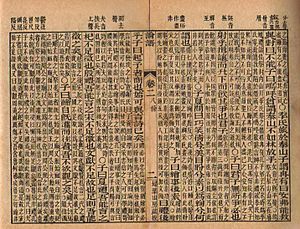
Confucius wanted people to think about other people more than about money or what they owned. However he also felt that there should be strong rules in society and that people needed to obey them. Confucius thought that there were five relationships people could have, and that they all had their own rules. Two people could be
These were traditional relationships called the 'five prototypes'. Confucius said that in all these relationships, both people must obey rules. For example, a subject must obey a prince, but also a prince must listen to a subject and must rule him well and fairly.
Confucius said that people should only do things to other people if they would be okay with other people doing those things to themselves.
Legacy
Confucius's teachings were later turned into an elaborate set of rules and practices by his numerous disciples and followers, who organized his teachings into the Analects. Confucius's disciples and his only grandson, Zisi, continued his philosophical school after his death. These efforts spread Confucian ideals to students who then became officials in many of the royal courts in China.
Confucius's works are studied by scholars in many other Asian countries, particularly those in the Chinese cultural sphere, such as Korea, Japan, and Vietnam. Many of those countries still hold the traditional memorial ceremony every year.
Among Tibetans, Confucius is often worshipped as a holy king and master of magic, divination and astrology. Tibetan Buddhists see him as learning divination from the Buddha Manjushri (and that knowledge subsequently reaching Tibet through Princess Wencheng), while Bon practitioners see him as being a reincarnation of Tonpa Shenrab Miwoche, the legendary founder of Bon.
The Ahmadiyya Muslim Community believes Confucius was a Divine Prophet of God, as were Lao-Tzu and other eminent Chinese personages.
In modern times, Asteroid 7853, "Confucius", was named after the Chinese thinker.
Confucius quotes
- "It does not matter how slowly you go as long as you do not stop."
- "Wherever you go, go with all your heart."
- "When it is obvious that the goals cannot be reached, don't adjust the goals, adjust the action steps."
- "Better a diamond with a flaw than a pebble without."
- "Silence is a true friend who never betrays."
- "Only the wisest and stupidest of men never change."
Memorials
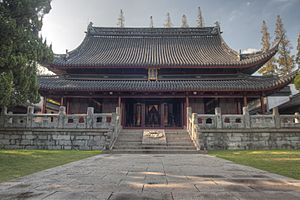
Soon after Confucius's death, Qufu, his home town, became a place of devotion and remembrance. The Han dynasty Records of the Grand Historian records that it had already become a place of pilgrimage for ministers. It is still a major destination for cultural tourism, and many people visit his grave and the surrounding temples. In Sinic cultures, there are many temples where representations of the Buddha, Laozi, and Confucius are found together. There are also many temples dedicated to him, which have been used for Confucian ceremonies.
In Taiwan, where the Nationalist Party (Kuomintang) strongly promoted Confucian beliefs in ethics and behavior, the tradition of the memorial ceremony of Confucius (祭孔) is supported by the government and has continued without interruption. While not a national holiday, it does appear on all printed calendars, much as Father's Day or Christmas Day do in the Western world.
In South Korea, a grand-scale memorial ceremony called Seokjeon Daeje is held twice a year on Confucius's birthday and the anniversary of his death, at Confucian academies across the country and Sungkyunkwan in Seoul.
Descendants
Confucius's descendants were repeatedly identified and honored by successive imperial governments with titles of nobility and official posts.
Famous descendants include actors such as Gong Yoo (real name Gong Ji-cheol (공지철)) and Gong Hyo-jin (공효진); and artists such as male idol group B1A4 member Gongchan (real name Gong Chan-sik (공찬식)), singer-songwriter Minzy (real name Gong Min-ji (공민지)), as well as her great aunt, traditional folk dancer Gong Ok-jin (공옥진).
A descendant of Confucius, H. H. Kung, was the Premier of the Republic of China. One of his sons, Kong Lingjie (孔令傑), married Debra Paget who gave birth to Gregory Kung (孔德基).
Because of the huge interest in the Confucius family tree, there was a project in China to test the DNA of known family members of the collateral branches in mainland China. The aim of the genetic test was to help members of collateral branches in China who lost their genealogical records to prove their descent.
In 2013 a DNA test performed on multiple different families who claimed descent from Confucius found that they shared the same Y chromosome.
The fifth and most recent edition of the Confucius genealogy was printed by the CGCC. It was unveiled in a ceremony at Qufu on September 24, 2009. Women are now included for the first time.
See also
 In Spanish: Confucio para niños
In Spanish: Confucio para niños


